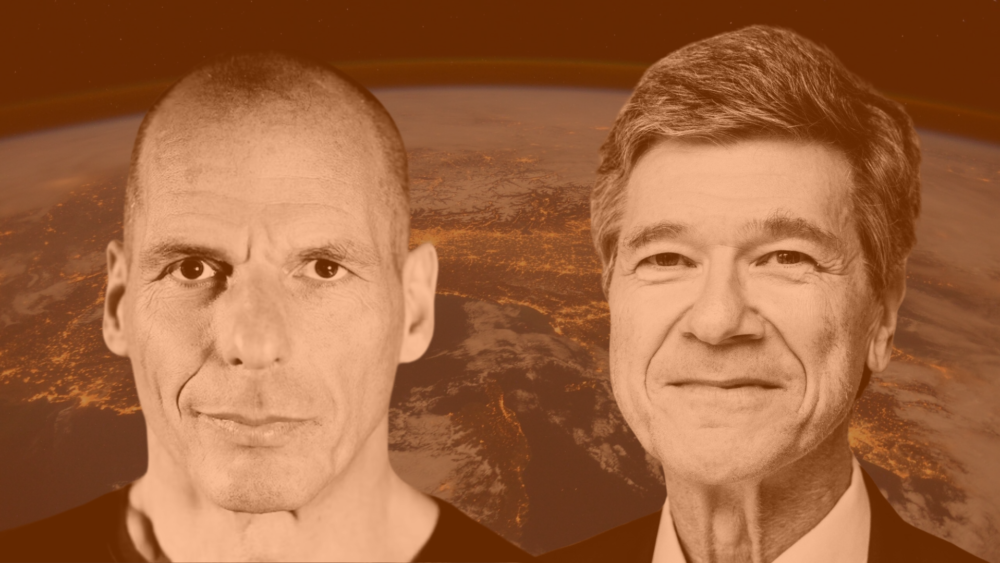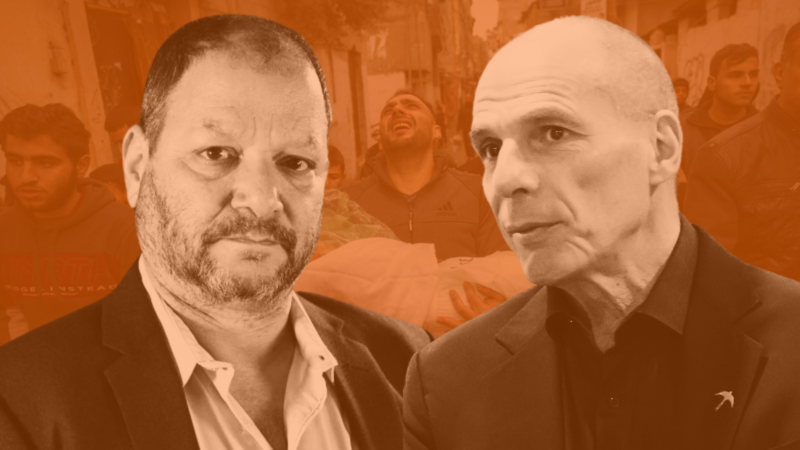In a record-breaking episode of our biweekly livestream, Yanis Varoufakis sat down with renowned economist Jeffrey Sachs to discuss the urgent global challenges confronting humanity.
The dialogue was not just a recollection of past predictions and current realities but a call to action for pressing systemic changes.
A decade-long prediction
Yanis opened with the origins of DiEM25, reflecting on a prescient question asked during its inception: How long does Europe have before it collapses under its policies of austerity for the many and socialism for the few? “Back then, this was the end of 2015. We predicted that Europe had at most 10 years before it collapses,” Yanis remarked, noting that the grim future they foresaw seemed to be unfolding before their eyes.
He acknowledged the paralysis and deindustrialisation afflicting Europe, describing it as lacking in serious investment in green and digital technology, and critiqued its subordination to the US and NATO agendas. Despite these bleak forecasts, Yanis reaffirmed DiEM25’s resilience: “We don’t give up. Not easily. Actually, we never give up.”
Jeffrey Sachs: From insider to outsider
Jeffrey Sachs, initially an optimistic insider engaged with European leaders, recounted his experiences witnessing the unfolding economic crises. “What I would say is that, in 2015, I knew how incredibly stupid my [Greek] government was. But I still had some hopes for Europe,” he admitted. However, disillusionment quickly set in during a meeting with German finance officials, where humanitarian concerns over Greece’s economic crisis were coldly dismissed.
Sachs noted, “the level of misgovernance in Europe continues to amaze me.” He expressed astonishment at Europe’s inability to navigate peace initiatives and its insistence on military confrontations, asserting that Europe’s governance could not even recognise peace when it was right before them.
Trump, Trade, and the shadow of inflation
Turning to Trump’s administration, Yanis and Sachs dissected the economic strategies underpinning the dollar’s divide. Sachs criticised Donald Trump‘s macroeconomic manoeuvres, labelling them as dangerous, with deficits being irresponsibly managed. Sachs argued that “countries succeed not by manipulation of currencies, but by science, technology, and education.”
The conversation shifted towards Trump’s economic policy, where Sachs delivered a harsh critique: “We’re getting a bloodbath of market valuation. It’s a sign of a policy that is viewed as being incoherent.”
Global politics and the looming shadow of conflict
Varoufakis and Sachs also tackled the geopolitical tensions exacerbated by Trump’s presidency. Sachs offered a stark warning about potential military escalations in Taiwan, echoing fears of another disastrous conflict akin to Ukraine. “It’s crazy stuff. We must avoid pushing for Taiwan’s independence; otherwise, a war is inevitable,” Sachs cautioned.
He lamented the overreach of US foreign policy, emphasising the importance of neutrality, especially in Ukraine and Taiwan. Sachs added, “This is really dangerous. It’s a militarised society. Washington is filled with people talking about war with China.”
A perilous inaction on climate change
Sachs shared grave concerns for the environment amidst the fossil fuel industry’s dominance. Although disenchanted with the US leadership under Trump, Sachs acknowledged China‘s significant progress in green technology. “China not only is massively installing zero-carbon energy, but it leads in solar, wind, nuclear… everything the world needs for a massive scale-up,” Sachs stated.
As climate safety timeframes eclipse, Sachs expressed hope for change driven by global cooperation outside traditional Western power structures.
He concluded by entreating the audience: “We have computers. We have AI. They should be our slaves so that everybody could have this kind of life of learning and scholarship.”
Conclusion
Though the conversation between Varoufakis and Sachs painted a dire picture of geopolitical and ecological crises, it also highlighted a potential pathway to renewal through global cooperation and technological advancement. For DiEM25 and our followers, the task remains to advocate for these changes.
Do you want to be informed of DiEM25's actions? Sign up here















